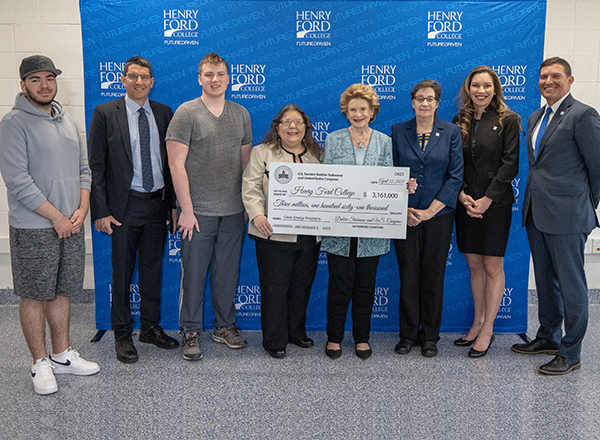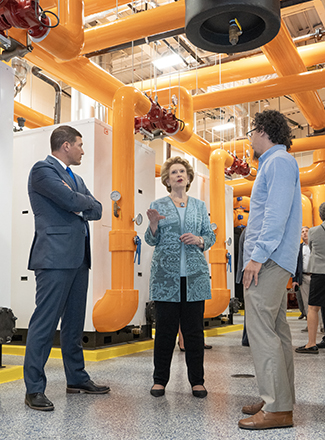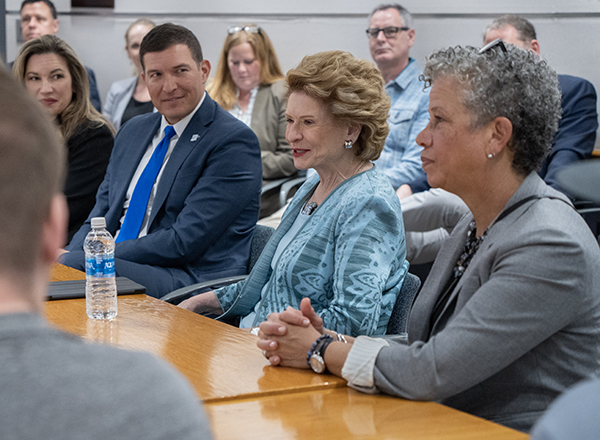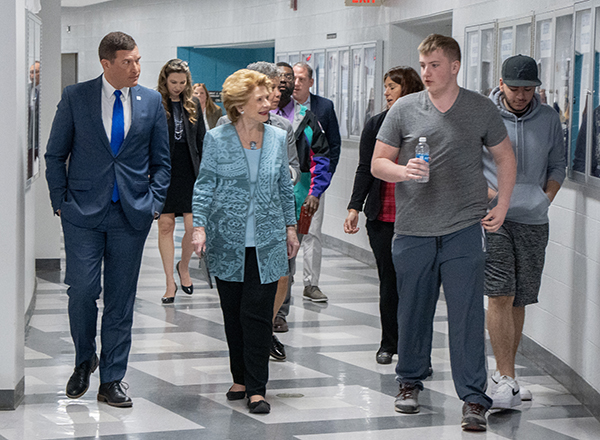U.S. Senator Debbie Stabenow visits HFC to celebrate major investment in sustainable energy and student careers

On April 12, U.S. Senator Debbie Stabenow (D-Mich.), alongside leaders from Henry Ford College, Johnson Controls, and Garforth International, celebrated a $3.1 million appropriation to support a sustainability initiative that demonstrates how schools, cities, and organizations across the U.S. can reach their net zero targets, as well as train the next generation of energy leadership.
Senator Stabenow pointed out that climate change is one of the defining challenges of our generation. For energy-related industries and businesses across our state, one of their biggest challenges is building a trained, effective workforce for the future. The work HFC is doing in sustainable energy sets a global standard that thoroughly addresses both challenges. This is hope come to life, according to the Senator.
With an Integrated Energy Master Plan (IEMP) as the cornerstone of the campus transformation, HFC will reach its net zero targets while providing students with an unprecedented educational experience. The Living Learning Classroom experience will support emerging career pathways, build the workforce of the future, and foster innovators who will create a more sustainable energy future.
The IEMP sets the stage for breakthrough results well ahead of HFC’s target date of 2040. These include increasing energy efficiency by 60%, cutting greenhouse gas emissions by at least 50% and increasing water use efficiency by more than 40%. The immediate energy transformation includes the following at the 75-acre main campus:
- Heating System: A lower-temperature district energy network, which replaces the 60-year-old inefficient high-temperature system
- Air Handling Upgrades: Extensive improvements to air handling equipment for better control, comfort and air quality
- Controls and Metering: A campus-wide system upgrade to allow real-time optimization of the College’s energy performance, as well as addressing occupant comfort
- Lighting: Upgraded to LED lighting campus-wide
- Solar Photovoltaic (PV) Arrays: Generating clean power from the sun
- Water Conservation: Upgraded water fixtures, toilets and zero-water landscaping
- Building Envelope: Building envelope improvements, including roof upgrades
“Henry Ford College has an impressive track record of training students for jobs of the future. This project strengthens that track record by giving students hands-on experience and training with state-of-the-art clean energy equipment, while benefiting the College with greater energy efficient systems. That’s why I was so excited to secure these funds in last year’s federal budget,” said Senator Stabenow.
Future-forward curriculum fosters next generation of energy leaders
The IEMP is leading the industry forward in its transition to a more comprehensive response for energy-related curriculum, through which students will learn in real time by observing and interacting with the College’s own systems. The “living learning classroom” will open new career pathways for students interested in entering a rapidly growing field. HFC’s programs offer a one-year major for technicians, a two-year major for project managers and a path to a bachelor’s degree in energy production. Graduates will enter the workforce prepared for careers that will provide family-sustaining wages and foster financial equity.
“At Henry Ford College, our mission is student success in all its forms,” said HFC President Russ Kavalhuna. “We are grateful to Senator Stabenow for her unwavering support, and for her hard work in securing this appropriation, which will support our students in valuable ways. We believe a better future for our students and community includes a healthy planet, community, and a sustainable energy model. This is one reason we are pleased to partner with companies like Johnson Controls to invest in the sustainability of our facilities and the career pathways of our students. We hope our College will serve as a model to like-minded institutions that are ready to embark on their own sustainable energy and curricular innovation journeys.”
HFC graduates get special consideration for jobs at global powerhouse Johnson Controls
The creation and expansion of HFC’s Energy Technology Program is supported by the Johnson Controls Community College Partnership Program, a major philanthropic initiative aimed at investing some $15 million in community colleges across North America. In total nearly $3 million has been committed, of which $190,000 has been donated to HFC since 2021 to support more than 50 students interested in energy-related careers. The funding also supports scholarships and builds connections with Detroit-based high schools to encourage interest among prospective students.
Johnson Controls will give priority consideration for employment to graduates of the program as the company continues its drive to bring new and diverse talent to a vital industry shaping the future of our communities and the planet.
“We are honored to partner with forward-thinking higher education institutions to foster the next generation of sustainability experts,” said Chuck McGinnis, vice president, North America Sustainable Infrastructure, Johnson Controls. “We’re thrilled to see how Henry Ford College, a member of the inaugural cohort of schools in the Johnson Controls Community College Partnership Program, is leveraging its funds to deploy an IEMP that leads the way in net zero higher education, contributes to a growing field and supports the workforce in its surrounding community.”



